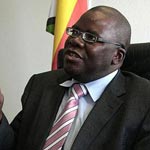
THE International Monetary Fund (IMF) executive board meets next month to decide whether or not it should have an accelerated engagement on Zimbabwe.
Report by Ndamu Sandu If the board rules in Zimbabwe’s favour, it would open the taps for lines of credit badly needed to revive the economy after a decade of recession. The meeting comes after Zimbabwe has made strides in embracing reforms, with the assistance of the global lender.
Finance minister, Tendai Biti, said Zimbabwe was confident of a positive result from the meeting.
“We believe that our macro-economic fundamentals are sound,” said Biti.
“Sterp (Short Term Emergency Recovery Programme) is on course. MTP (Medium Term Plan) is on course and there should be no reason at all why a positive decision should not be made in our favour.”
He said the positive outcome would enable Zimbabwe to deal with its arrears clearance plan.
Zimbabwe’s debt, Biti said, prevented the country from accessing the necessary levels of capital finance at the IMF, World Bank and African Development Bank (AfDB).
As at June 30, Zimbabwe’s arrears to the IMF stood at US$135 million under the Poverty Reduction Growth Trust, while US$932 million was owing to the World Bank and US$570 million to AfDB.
- Chamisa under fire over US$120K donation
- Mavhunga puts DeMbare into Chibuku quarterfinals
- Pension funds bet on Cabora Bassa oilfields
- Councils defy govt fire tender directive
Keep Reading
Zimbabwe’s total external debt stands at over US$9 billion and has been termed as unsustainable up to 2029.
The re-engagement meeting also comes after a joint IMF/World Bank visit to Zimbabwe in June as a follow up to meetings in Tunisia and Washington DC where consensus was built among all creditors and other stakeholders over the process of resolving the country’s external debt.
Early this year, principals in the inclusive government approved the Zimbabwe Accelerated Arrears Clearance, Debt and Development Strategy that uses a combination of debt relief and resources pledging to clear the country’s debt.
Next month’s meeting would come up with recommendations on how Zimbabwe’s indebtedness should be tackled.
According to a joint IMF/World Bank approach to debt reduction, no poor country faces a debt burden it cannot manage.
Under its Heavily Indebted Poor Countries (HIPC) initiative, 36 countries — 30 of them from Africa — have benefited from the US$76 billion in debt-service relief over time.
HIPC is complemented by the Multilateral Debt Relief Initiative that allows 100% relief on eligible debts by three multilateral institutions — IMF, World Bank and the AfDB — for countries completing the HIPC Initiative process.
To qualify for HIPC, a country should be able to borrow from the World Bank’s International Development Agency, which provides interest-free loans and grants to the world’s poorest countries.
A country should also have faced an unsustainable debt burden and established a track record of reform and sound policies through IMF and World Bank supported programmes. It should also have developed a Poverty Reduction Strategy Paper (PRSP) through a broad-based participatory process.
Once a country has made sufficient progress in meeting these four criteria, the Executive Boards of the IMF and World Bank formally decide on its eligibility for debt relief, and the international community commits to reducing debt to a level that is considered sustainable.











